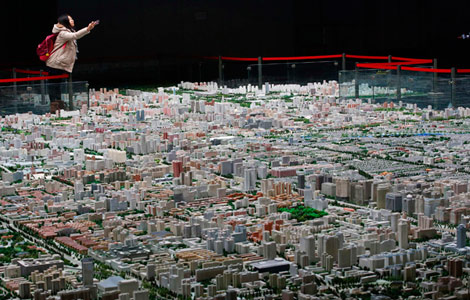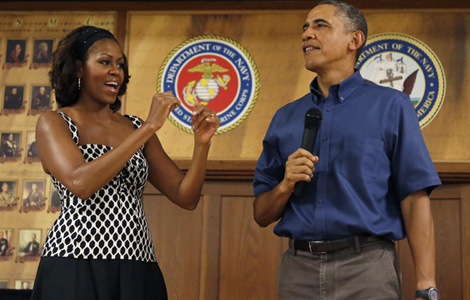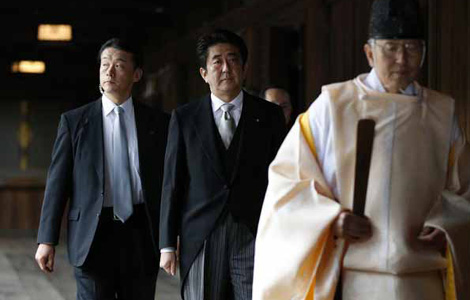Abe's shrine visit grave provocation
Updated: 2013-12-26 12:54
(Xinhua)
|
||||||||
BEIJING - Japanese Prime Minister Shinzo Abe's visit to the Yasukuni shrine on Thursday is a grave provocation that may lead to heightened tension in the region.
The visit came at the first anniversary of Abe's taking office as prime minister. It is also the first visit by a sitting Japanese prime minister since Abe's predecessor Junichiro Koizumi visited the shrine in 2006.
Choosing a sensitive time to visit a highly controversial and notorious place, Abe knows perfectly what he is doing and the consequences.
Instead of a pledge against war, as Abe has claimed, the visit is a calculated provocation to stoke further tension.
It will deeply hurt the feelings of those victimized by Japan's war crimes, stirring up nightmare memories among Japan's neighboring countries.
By visiting the shrine that honors Japan's war criminals, Abe is publicly challenging the post-World War II order, and embracing the country's dangerous tradition of militarism.
The visit is the culmination of Abe's year-long policy of right-wing nationalism.
During the past twelve months, Japan, for the first time in eleven years, raised its military budget.
Earlier this month, Tokyo approved a new national security strategy and defense policy package spearheaded by Abe to expand its military might.
In the security strategy, Japan vowed to seek more "proactive" roles for its military forces abroad and to set new guidelines on arms exports, signaling a major shift from its previous restrictive policy.
Japan also unveiled a so-called "helicopter-equipped destroyer" Izumo which is much more like an aircraft carrier with a length of 248 meters and a weight of 19,500 tons on the 68th anniversary of a U.S. atomic bombing in August.
Despite Japan's domestic economic woes, a considerable amount of government spending has been or will be invested in building up military strength instead of beating a 15-year deflation.
Apart from those military moves, the Abe administration also seized every opportunity to recast Japan's wartime history with a impenitent tone.
In April, Abe said that the definition of "aggression" has yet to be fixed, trying to defend Japan's invasion into Asian neighbors during the Second World War.
The hawkish and irresponsible actions and remarks, vainly whitewashing the country's war crimes in its history, will only hurt Japan's relations with the war-victim countries.
The right-wing Japanese politicians, who never fully understood how to deal with its history of militarist aggression, is steering Japan towards a dangerous road leading to nowhere, again.
- South Korea angry about Abe's shrine visit
- Abe's Yasukuni Shrine visit a dangerous step
- Abe's shrine visit grave provocation
- China strongly condemns Abe's shrine visit
- Japan's minister visits war-linked shrine
- China responds to Japan cabinet members' shrine visit
- About 160 Japanese lawmakers visit Yasukuni Shrine
Most Viewed
Editor's Picks

|

|

|

|

|

|
Today's Top News
Factories halted to clear air in Beijing
China's urbanization rate to hit 60% by 2018
Reform plans give US 'hope about trade'
Foreign patients treated like natives
Abe's shrine visit grave provocation
Viacom-Sohu.com deal 'a foothold': analyst
Abe to visit Yasukuni Shrine
US just passing the buck
US Weekly

|

|














